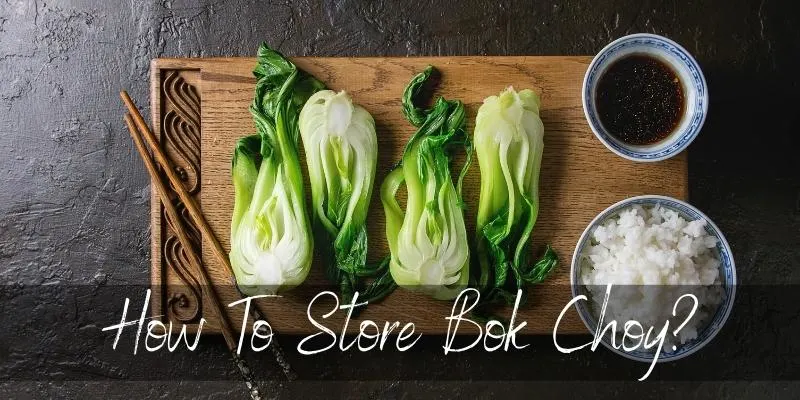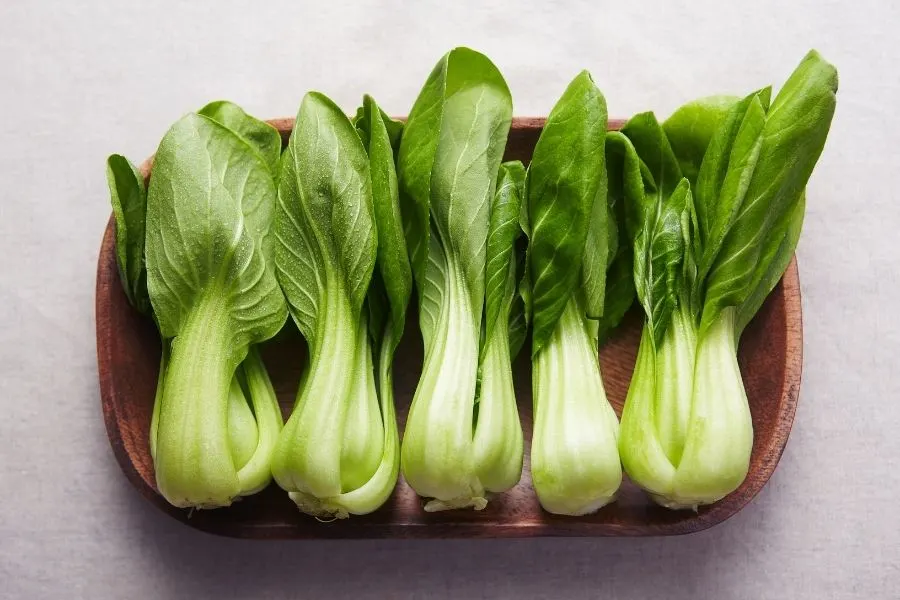When you first try bok choy and find out what it tastes like, you most probably want to buy more for later use.
But since it is like two veggies in one, and I mean that it has a stem very close to cabbage and leaves that are more like lettuce, it is hard to know how to store bok choy properly.
I’m glad that you like it and want some for later, so I will talk in this article about various ways to store your bok choy and signs that it has gone bad to know if it’s still worth the effort of storing it.

How to store bok choy?
To store bok choy in the refrigerator, you have to shake it a bit to get rid of the dust, cover it very well in cling wrap, then place it in a plastic bag and put it in the refrigerator.
Whole bok choy can last 3-4 days in a refrigerator if stored properly.
Do not wash the bok choy before storing it in the refrigerator because adding extra moisture to the leaves will make them go bad faster. So make sure you wash it only when it is ready to be cooked, not before storing.
Does baby bok choy last longer than regular bok choy?
Baby bok choy will last the same as the regular bok choy if stored in the same way. Only the size makes the difference between them, so it should not impact how long they last.
Can you keep bok choy at room temperature ?
Keeping the bok choy at room temperature for more than a day is not recommended. This applies if you didn’t chop it yet, if this is the case, make sure you don’t keep it outside for more than two hours. The more you let bok choy sit out, the more it will wilt.

Read Also: Can You Freeze Scallops ?
Can you freeze bok choy?
Yes, you can freeze bok choy to keep it fresh for up to a year. We recommend you use it becore the 3 month mark though.
Before storing bok choy in the freezer you should follow a few steps.
- Wash them thoroughly.
- Blanch them. Throw the bok choy in boiled water for a few seconds, then take them out and chill them quickly in cold water.
- Drain the water, pat dry. You can use a paper towel for this process.
- Place them in a freezer bag or an airtight container and put them into the freezer.
Can you pickle bok choy?
Yes, you can pickle bok choy, which will help them last longer. You can pickle them with or without the leaves, and the taste will be very close to a pickled white cabbage.
This is a great way to keep them fresh, but it will not have the same usage as fresh raw bok choy.
Can bok choy be dehydrated?
Yes, it can be dehydrated using a food dehydrator or the baking oven, which will take much longer, but it will work for those that don’t have a food dehydrator.
In this case, as well as with pickled bok choy, you will most likely not be able to use it in all the recipes that a fresh raw bok choy will work.
So I decided not to put them as a storing method since you probably want fresh bok choy.
How long does cooked bok choy last?
In the case of cooked bok choy, it really depends on what other ingredients you use when cooking.
But as a guideline, it will not be recommended to keep the cooked food at room temperature for more than two hours since the bacteria grows at a temperature between 40-140 degrees F. after two hours, this is called the danger zone.
If you put any cooked food that can be made with bok choy in the refrigerator(here are some ideas), you should not keep it in the fridge for more than three days. Again this is not the exact time since a few factors can change this, but most of the time, this will be accurate.
How to know bok choy has gone bad?
Bok choy will change in color when it has gone bad. The leaves will not be bright green anymore, but rather a darker green and the stem will be more yellow than it should.
Also, if you notice any change in texture, it is a clear sign that it has gone bad. The stem and the leaves should be firm and crisp, not soft and wilted.
Read Also:How To Store Rutabaga
Conclusion
Storing bok choy can be tricky since you need to wash them before freezing them, and for refrigerating them, you should not.
So make sure you store them properly depending on when you plan to use them and what you plan to do with them.
Also, do not store them in the fridge for more than four days and before using them, check for the signs in case it has gone bad.

